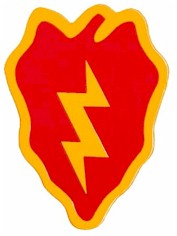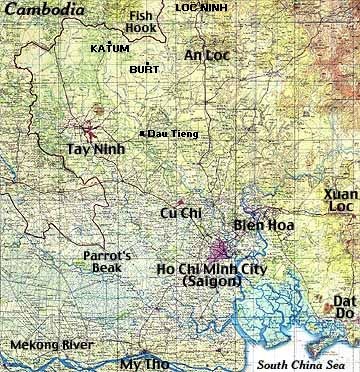
December 1967
One mission from
Vietnam
Alpha Company 2/12 Infantry 25th Division

—Sgt. John W. Stone
Tour Dates
Aug 1967- Aug 1968
|
T |
he guys in Alpha Company disappeared without warning. They were here one minute and gone the next. I never really did know what happened to many of them. Some had been transferred to a different unit and others simply left because their year was up. Some just dropped out of sight, only to be noticed they were gone, well after their departure. Others vanished suddenly before our eyes—many of which, were wounded or paid the ultimate price. Whatever the reason or whatever the cause of their disappearance, it was one of those things that all soldiers had to face at one time or another. It didn’t make any difference if you were a cook, an infantryman, an officer or a private. There was no guarantee when or if you would see your buddy again or if he would see you. The result of these sudden departures left us with no farewells—no handshakes—or without any good luck wishes. More often than not—there was no time to say good-bye.
My diary from Vietnam titled, “No Time To Say Good-bye”, started out to be just a letter I was writing to my parents. I decided not to send it because it contained too many details of what I was experiencing. I guess I just didn’t want to worry my parents anymore than they already were. That letter I never sent home, became a record of events of things I was experiencing and I just kept adding to it. Occasionally I wrote about what I did, what I saw, my feelings, my thoughts, and anything I could remember. If I didn’t know what happened, I would ask and wrote down what others told me. Soon it became the longest letter I had ever written. It took a while before I realized I wasn’t just selfishly writing about my own experiences; I was also writing about what the other guys were doing too. The difference was that many of the guys in the company were disappearing, while I was still writing.
This diary, which I never intended anyone to read, was written in 1967 and 1968. In the year 2003, thirty-six years later, I changed my mind. Most of the following account is one of those missions transcribed from this diary and is documented with photos from my albums. I don’t consider myself a writer—far from it. I am sure other guys have much better stories to tell and a much better way of telling them. So let’s just say, I’m not a writer and this isn’t a story… It’s real and it’s some things that happened to my acquaintances, friends and me while in Vietnam.
—John Stone
A - 2/12- 25th Infantry Division
Thunder Road Mission
—Sgt. John W. Stone
DATE: Mid-December 1967
LOCATION: Base Camp
Day One
I finished eating chow and I was chuckling all the way back from the mess hall to my hooch (sleeping quarters) to get my gear. As I was leaving the mess hall, I had told the guys in the chow line, “It takes the human body seventy-two hours to produce shit, and these cooks can do it in less than half an hour.” I don’t know if the cooks heard me, but the guys in the line laughed. Hope I make it back from this mission to see what they serve me tomorrow. I always look forward to see if I can guess what’s on my tray.
As I walked toward my hooch, the early morning sunlight was shining down through the rubber trees that were throughout most of the company area. The monsoon season was over and the ground was starting to dry out. I guess I was too. The guys told me, “Don’t get too comfortable—it’s going to get hot now …real hot!”— I just hoped they were talking about the weather and not the mission.
Mission Briefing
Company A, 2/12, 25th Infantry Division, was assigned a road-clearing mission for a U.S. convoy that was bringing supplies from the south. We also had to keep the road secure for the armored division that was expected to arrive in a few days. Our primary objective was to check the road for mines, booby traps, and VC (Viet Cong) ambushes. Basically, to insure the convoy and armored division had a safe clear passage through Binh Duong Province, the districts and villages to our base camp.
Finally we got to work out of our base camp. When we came into base camp between two of the last few missions, 45 minutes later we were “hatting it up” (quickly getting our gear on and moving out) and right back on shithooks (Chinook helicopters), heading for a place called Loc Ninh. During the next few days, we’ll pull some security and when were done, come back into base camp as a standby reactionary force—kind of like a nine to five job—a big change from the wretched existence “out in the field”.
The Field
Out in the field was a vague term for any remote location outside the perimeter of a base camp. Whether you were “humpin” (moving on patrol) in the jungle or boonies, boondocks or bush, you were in the field. It was where we conducted our missions and major operations while searching and fighting our enemy. It was the places Huey choppers took us on eagle flights and dropped us off in some wet rice paddy they called an LZ (landing zone). The field was where we went on the search and destroy missions, and where we set up ambushes and got caught in them as well. It was anywhere we set up camps, where we dug foxholes, taking turns defending them all night, and filled them in the next day. Out in the field were some of those places where you made friends and good buddies, and the same place where you lost most of them too. The field was where the war was and if you were out in it, and lived long enough, you could be damn sure you’d hit every type of terrain and everything else the field contained; thick tropical jungles, miles of enemy tunnels, huge underground bunkers, booby-trapped paths and roads, bugs, and of course, the enemy. The field—it was the place you either hated or loved, but most of us counted down to the day we’d be out of it.

Map 1. Compliments of http://www.users.qwest.net/~huffpapa/vietnam.html
Our field covered a large territory and was within one of the 4 military sectors of South Vietnam known as the III [Three] CORPS Tactical Zone. The South Vietnamese military called this area a tactical zone and some called it a military region or combat zone. It was within in this zone we had our field and anywhere we patrolled within the field was our AO (area of operations).
Basically this zone included Saigon and the entire area north to Bu Dop at the Central Highlands. Cambodia and its three-mile wide buffer was the western boundary of this zone and to the east, ended at the South China Sea.
The southern part of this zone included places such as the Cu Chi District, Ton Son Nhut, Ben Hoa, Long Binh and Thu Duc. Thirty-five miles northwest of Saigon, was the infamous Iron Triangle. This triangle, right next door to our camp, was plotted between the three villages of Ben Cat, Phu Hoa Dong, and Ben Suc. Farther to the north near the Cambodian border, was Katum. Still further north around a border area of Cambodia called “The Fish Hook", was Loc Ninh, Phuoc Binh (Song Be) and Bu Dop. To the west of our base camp was Tay Ninh Province and War zone “C” and to the east was the Michelin Rubber Plantation and War Zone “D”.
The strategic significance to the importance of this III Corps zone was that it was the main land passageway and included the rivers used to supply the Viet Cong in all these locations in South Vietnam. With Cambodia bordering our entire far west sector and the enemy’s supply line of the Ho Chi Minh trail just across the border, eventually these supplies and troops had to come through our tactical zone. Part of the job of the U.S. forces assigned to this zone was to search out Viet Cong activity and to stop this traffic of supplies and infiltrating troops, and with no doubt, constantly occurring right outside our base camp.